
Missamma is a 1955 Indian Telugu-language romantic comedy film directed by L. V. Prasad. It was produced by Nagi Reddi and Chakrapani on Vijaya Productions banner. The film stars N. T. Rama Rao, Savitri, Akkineni Nageswara Rao and Jamuna. The script was adapted by Chakrapani from Rabindranath Maitra's Bengali play Manmoyee Girls' School. It revolves around two unemployed people — M. T. Rao and Mary — who pose as a married couple to obtain employment in a high school founded by Gopalam, a zamindar. As Rao and Mary fall in love, Gopalam's nephew A. K. Raju learns that Mary is Gopalam's missing elder daughter Mahalakshmi; she is unaware of her true identity.
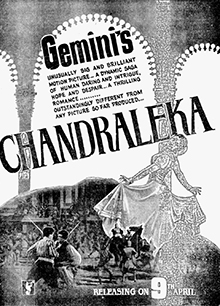
Chandralekha is a 1948 Indian historical adventure film produced and directed by S. S. Vasan of Gemini Studios. Starring T. R. Rajakumari, M. K. Radha and Ranjan, the film follows two brothers who fight over ruling their father's kingdom and marrying a village dancer, Chandralekha.

Subramaniam Srinivasan, popularly known by his screen name S. S. Vasan, was an Indian journalist, writer, advertiser, film producer, director and business tycoon. He is the founder of the Tamil-language magazine Ananda Vikatan and the film production company Gemini Studios, Gemini Film Laboratories and Gemini Picture Circuit. He was a member of parliament from 1964 and served his term till his death.
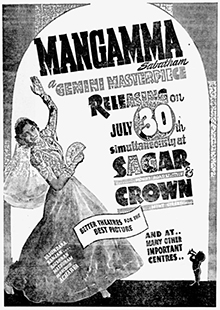
Mangamma Sabatham is a 1943 Indian Tamil-language film, starring Vasundhara Devi, Ranjan, N. S. Krishnan and T. A. Mathuram. The film was produced by S. S. Vasan and directed by T. G. Raghavachari, credited as Acharya. The film was remade in Hindi and Telugu as Mangala and again in Telugu as Mangamma Sapatham (1965).
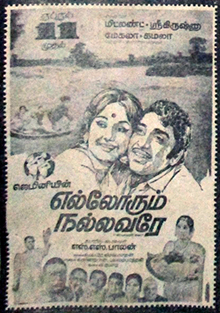
Ellorum Nallavare is a 1975 Indian Tamil-language film, directed and produced by S. S. Balan. It is a remake of the 1974 Kannada film Bhootayyana Maga Ayyu. It was simultaneously produced in Telugu and Hindi languages as Andaroo Manchivare and Ek Gaon Ki Kahani. The trilingual was the last production of Gemini Studios; except for the Telugu version, it emerged a box-office bomb and led to the studio's collapse.
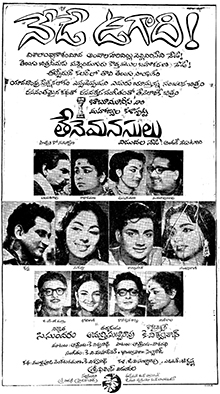
Thene Manasulu is a 1965 Indian Telugu-language romance film directed by Adurthi Subba Rao and produced by C. Sundaram under the Babu Movies banner. The film stars Krishna, Ram Mohan, Sukanya, and Sandhya Rani in lead roles. Notably, it was the first Telugu social film to be shot entirely in colour. The story was based on the novel Vakrinchina Saralarekhalu by K. R. K. Mohan.
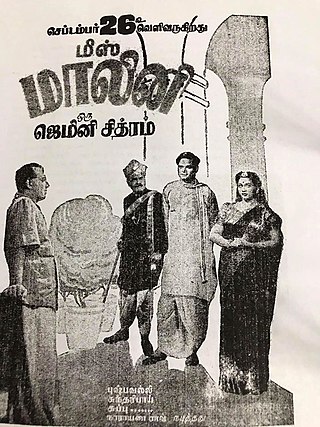
Miss Malini is a 1947 Indian Tamil-language satirical film written and directed by Kothamangalam Subbu and produced by K. Ramnoth, based on a story by R. K. Narayan. Subbu also starred in the film alongside Pushpavalli and M. S. Sundari Bai. Javar Seetharaman and Gemini Ganesan made their acting debuts in the film appearing in minor supporting roles. The film focuses on Malini (Pushpavalli), an impoverished woman who joins her actress friend Sundari's theatre company Kala Mandhiram and becomes a success. Things take a turn for the worse when she befriends a charlatan named Sampath.

Ranjan was an Indian actor, singer, journalist and writer. He debuted in the 1941 movie Ashok Kumar, but gained fame in S. S. Vasan's 1948 magnum opus Chandralekha.

Radha Kalyanam is a 1981 Indian Telugu-language romantic drama film written by Mullapudi Venkata Ramana and directed by Bapu It is a remake of the Tamil film Andha 7 Naatkal (1981) directed by K. Bhagyaraj. The film stars Chandra Mohan, Radhika and Sarath Babu. It was released on 3 December 1981. Bapu went on to direct the Hindi version titled Woh Saat Din in 1983.

Apoorva Sagodharargal is a 1949 Indian Tamil-language action film directed by Acharya. The film which was adapted from Alexandre Dumas' 1844 novella The Corsican Brothers stars M. K. Radha and P. Bhanumathi, with Nagendra Rao and Suryaprabha playing supporting roles. It revolves around the two lookalike brothers who were separated during childhood by their cruel uncle who murdered his parents, rest of the film shows how two brothers join in avenging the death of their parents.
Rajasree, also known as Rajasri or Rajashri, is an Indian actress active from 1956 to 1979. She is particularly famous for her portrayal as a princess in several folklore Telugu movies opposite N. T. Rama Rao and Tadepalli Lakshmi Kanta Rao and for acting alongside Ravichandran in the Tamil comedy films Neeyum Naanum, Kadhalikka Neram Illai and Delhi Mappilai. Notable among Rajasri's roles in non-folklore social films in Tamil are as Nimmi in the Tamil hit comedy film Kaadhalikka Neramillai, remade as Preminchi Choodu in Telugu, as movie star Bhama in Tamil film Bama Vijayam. She was credited as Gracy in the Malayalam movies she starred in her career since her debut film Bharya (1962), directed by Kunchako. Rajasree went on to do 200 films spread across the languages – Telugu, Tamil, Kannada, Malayalam and Hindi from beginning of 1956 to 1979.
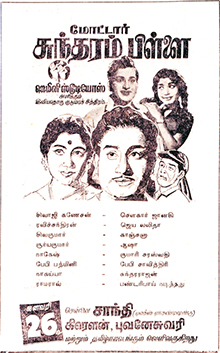
Motor Sundaram Pillai is a 1966 Indian Tamil-language drama film directed by S. S. Balan and written by Veppathur Kittoo. A remake of the Hindi film Grahasti (1963), itself based on the American film The Remarkable Mr. Pennypacker (1959), the film stars Sivaji Ganesan, Ravichandran, Sowcar Janaki and Jayalalithaa. It revolves around a man who leads a double life, having two sets of families.

Annai ( transl. Mother) is a 1962 Indian Tamil-language drama film directed by Krishnan–Panju. The film stars P. Bhanumathi and Sowcar Janaki, with S. V. Ranga Rao, J. P. Chandrababu and P. Raja playing supporting roles. The plot revolves around the theme that the love of a foster mother can be even stronger than that of a biological mother.
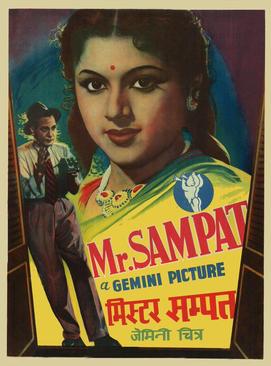
Mr. Sampat is a 1952 Indian Hindi-language satirical film produced and directed by S. S. Vasan of Gemini Studios. It is based on R. K. Narayan's 1949 novel Mr. Sampath – The Printer of Malgudi, and the Tamil film Miss Malini (1947). The film revolves around the titular con artist (Motilal) who manipulates an actress (Padmini) and a merchant (Kanhaiyalal) for his own benefits.

Missiamma is a 1955 Indian Tamil-language romantic comedy film directed by L. V. Prasad. Produced by B. Nagi Reddy and Aluri Chakrapani's Vijaya Vauhini Studios, the script was adapted by Chakrapani from the Bengali novel Manmoyee Girls School by Rabindranath Maitra. Missiamma also focused on social issues such as unemployment, corruption, and freedom of worship. Missiamma tells the story of two unemployed people of different religions and mentalities: Balu and Mary. They pose as a married couple to obtain jobs in a high school founded by Gopal, the zamindar of Aandipettai. As Balu and Mary fall in love, Gopal's nephew Raju learns that Mary is Gopal's missing elder daughter Mahalakshmi; she is unaware of her true identity.
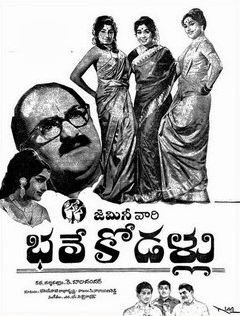
Bhale Kodallu is a 1968 Telugu-language comedy film written and directed by K. Balachander. It was simultaneously filmed in Tamil as Bama Vijayam, despite being released more than a year after that. The film features an ensemble cast consisting of S. V. Ranga Rao, Sowcar Janaki, Kanchana, Jayanthi, Nagabhushanam, Ramakrishna, Chalam, Rajasree and Saraswathi.

Samsaram (transl. Wife) is a 1951 Indian Tamil-language drama film directed by Chandru and produced by S. S. Vasan. A remake of the 1950 Telugu film of the same name, it stars M. K. Radha, Pushpavalli, Kumari Vanaja, Sriram, M. S. Sundari Bai, T. R. Ramachandran, D. Balasubramaniam, R. Balasubramaniam, K. N. Kamalam, and Kamalaveni Ammal. The film was simultaneously filmed in Hindi as Sansar, which Vasan directed.

Kathal Paduthum Padu is a 1966 Indian Tamil-language romance film directed by Joseph Thaliath Jr and produced under Citadel Studios. The film stars Jaishankar and Vanisri, the latter's debut in Tamil cinema. It was released on 7 October 1966 and became a commercial success. The film was remade in Telugu as Premalo Pramadam (1967).

Pasher Bari is a 1952 Indian Bengali-language romantic comedy film directed by Sudhir Mukherjee based on the short story of the same name by Arun Chowdhury. This film was released on 7 March 1952 under the banner of Production Syndicate. The film was a major success at the box office catapulting Sabitri Chatterjee to stardom. Several Indian films were made adapting the same story including the Telugu film Pakka Inti Ammayi (1953), the Tamil film Adutha Veettu Penn (1960), the Hindi film Padosan (1968), another Telugu film Pakkinti Ammayi (1981) and the Kannada film Pakkadmane Hudugi (2004).


















